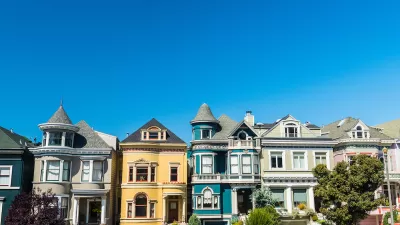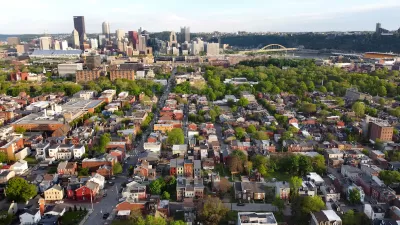Fast Company blogger Michael Cannell says the economic crisis stands to make big winners out of the new urbanists.
"The downturn has accomplished what a generation of designers and planners could not: it has turned back the tide of suburban sprawl. In the wake of the foreclosure crisis many new subdivisions are left half built and more established suburbs face abandonment. Cul-de-sac neighborhoods once filled with the sound of backyard barbecues and playing children are falling silent. Communities like Elk Grove, Calif., and Windy Ridge, N.C., are slowly turning into ghost towns with overgrown lawns, vacant strip malls and squatters camping in empty homes. In Cleveland alone, one of every 13 houses is now vacant, according to an article published Sunday in The New York Times magazine.
The demand for suburban homes may never recover, given the long-term prospects of energy costs for commuting and heating, and the prohibitive inefficiencies of low-density construction. The whole suburban idea was founded on disposable spending and the promise of cheap gas. Without them, it may wither. A study by the Metropolitan Institute at Virginia Tech predicts that by 2025 there will be as many as 22 million unwanted large-lot homes in suburban areas."
Thanks to Neil Takemoto
FULL STORY: Suburbia R.I.P.

Planetizen Federal Action Tracker
A weekly monitor of how Trump’s orders and actions are impacting planners and planning in America.

The Simple Legislative Tool Transforming Vacant Downtowns
In California, Michigan and Georgia, an easy win is bringing dollars — and delight — back to city centers.

San Francisco's School District Spent $105M To Build Affordable Housing for Teachers — And That's Just the Beginning
SFUSD joins a growing list of school districts using their land holdings to address housing affordability challenges faced by their own employees.

In More Metros Than You’d Think, Suburbs are Now More Expensive Than the City
If you're moving to the burbs to save on square footage, data shows you should think again.

The States Losing Rural Delivery Rooms at an Alarming Pace
In some states, as few as 9% of rural hospitals still deliver babies. As a result, rising pre-term births, no adequate pre-term care and "harrowing" close calls are a growing reality.

The Small South Asian Republic Going all in on EVs
Thanks to one simple policy change less than five years ago, 65% of new cars in this Himalayan country are now electric.
Urban Design for Planners 1: Software Tools
This six-course series explores essential urban design concepts using open source software and equips planners with the tools they need to participate fully in the urban design process.
Planning for Universal Design
Learn the tools for implementing Universal Design in planning regulations.
Smith Gee Studio
City of Charlotte
City of Camden Redevelopment Agency
City of Astoria
Transportation Research & Education Center (TREC) at Portland State University
US High Speed Rail Association
City of Camden Redevelopment Agency
Municipality of Princeton (NJ)





























